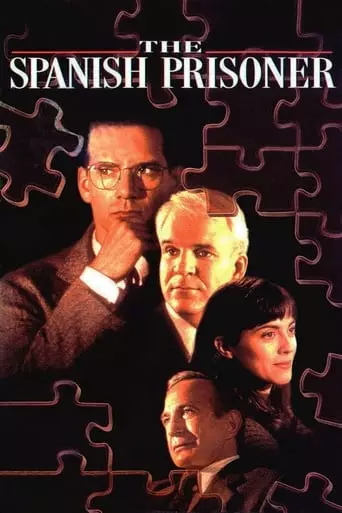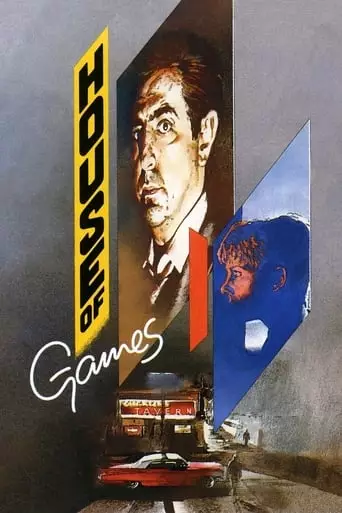Joe Moore has a job he loves. He’s a thief. His job goes sour when he gets caught on security camera tape. His fence, Bergman, reneges on the money he’s […]

Joe Moore has a job he loves. He’s a thief. His job goes sour when he gets caught on security camera tape. His fence, Bergman, reneges on the money he’s […]

A movie crew invades a small town whose residents are all too ready to give up their values for showbiz glitz. State and Main is a sharp, satirical comedy directed […]

A Jewish homicide detective investigates a seemingly minor murder and falls in with a Zionist group as a result. Directed by David Mamet, Homicide is a neo-noir crime drama that […]

Is there room for principle in Los Angeles? Mike Terry teaches jujitsu and barely makes ends meet. His Brazilian wife, whose family promotes fights, wants to see Mike in the […]

U.S. government agent Scott is assigned to rescue the daughter of a high-ranking government official. As willing as he is to bend the rules to get things done, though, Scott […]

An inventor of a secret process suddenly finds himself alone as both his friends and the corporation he works for turn against him. The Spanish Prisoner is a 1997 thriller […]

A psychiatrist comes to the aid of a compulsive gambler and is led by a smooth-talking grifter into the shadowy but compelling world of stings, scams, and con men. House […]
David Mamet: The Master of Dialogue and Tension in American Cinema
David Mamet is an American playwright, screenwriter, and director renowned for his sharp, rhythmic dialogue and incisive exploration of power dynamics, deception, and moral ambiguity. A Pulitzer Prize-winning playwright for Glengarry Glen Ross (1984), Mamet transitioned into filmmaking in the 1980s, where his distinct voice brought a unique intensity to American cinema.
Known for films like House of Games (1987), The Spanish Prisoner (1997), and State and Main (2000), Mamet’s directorial work reflects his fascination with human behavior and the art of manipulation. His contributions to both stage and screen have cemented him as one of the most influential and provocative storytellers of his time.
Early Life and Career
David Alan Mamet was born on November 30, 1947, in Chicago, Illinois. Growing up in a working-class Jewish family, Mamet developed a keen ear for the rhythms of everyday speech, which would later become a hallmark of his writing. He attended Goddard College in Vermont, where he began experimenting with playwriting.
Mamet first gained prominence in the 1970s as a playwright, with works like American Buffalo (1975) and Glengarry Glen Ross, which captured the struggles and duplicities of ordinary people in raw, unflinching prose. His success on stage naturally led to opportunities in Hollywood, where he wrote acclaimed screenplays such as The Verdict (1982) and The Untouchables (1987).
Transition to Directing
Mamet made his directorial debut with House of Games (1987), a psychological thriller about a con artist and a psychiatrist who becomes entangled in his schemes. The film showcased Mamet’s signature elements: taut dialogue, intricate plotting, and a focus on the interplay between trust and betrayal.
From there, Mamet continued to explore themes of manipulation and moral compromise, often crafting films that blurred the line between truth and deception.
Hallmarks of Mamet’s Style
Distinctive Dialogue: Mamet’s writing is instantly recognizable for its staccato rhythms, repetition, and naturalistic yet heightened speech patterns, often referred to as “Mamet-speak.”
Themes of Deception: His films frequently revolve around characters who manipulate or deceive others, whether for personal gain or survival.
Moral Ambiguity: Mamet’s stories resist easy answers, forcing audiences to grapple with ethical dilemmas and the darker sides of human nature.
Minimalist Aesthetic: As a director, Mamet often employs a restrained visual style, allowing the dialogue and performances to take center stage.
Key Films
House of Games (1987)
Mamet’s directorial debut is a gripping exploration of trust and manipulation. The film follows a psychiatrist (Lindsay Crouse) who becomes drawn into the world of con artists, led by a charismatic grifter (Joe Mantegna). House of Games established Mamet as a filmmaker with a unique voice and a talent for crafting psychological tension.
The Spanish Prisoner (1997)
A modern-day Hitchcockian thriller, The Spanish Prisoner tells the story of an inventor (Campbell Scott) who becomes ensnared in an elaborate corporate espionage scheme. The film’s intricate plotting and morally ambiguous characters exemplify Mamet’s skill as a storyteller.
State and Main (2000)
In this satirical comedy, Mamet turns his sharp wit toward the film industry itself. The story of a small-town production plagued by egos and scandals showcases Mamet’s lighter side while retaining his trademark incisiveness.
Redbelt (2008)
A martial arts drama, Redbelt explores themes of honor, discipline, and corruption. The film centers on a jiu-jitsu instructor (Chiwetel Ejiofor) who becomes embroiled in a series of moral and financial dilemmas. Redbelt highlights Mamet’s ability to bring philosophical depth to genre storytelling.
Screenwriting Highlights
Beyond his directorial work, Mamet’s screenplays have left an indelible mark on cinema.
The Verdict (1982): A courtroom drama starring Paul Newman, this film earned Mamet an Academy Award nomination for its tightly constructed narrative and powerful character study.
The Untouchables (1987): Directed by Brian De Palma, this crime classic features Mamet’s sharp dialogue and memorable lines, including Sean Connery’s famous “Chicago way” speech.
Wag the Dog (1997): Co-written with Hilary Henkin, this political satire about media manipulation earned Mamet another Oscar nomination for Best Adapted Screenplay.
Legacy and Influence
David Mamet’s work has influenced countless writers and filmmakers, from Quentin Tarantino to Aaron Sorkin, who have drawn inspiration from his mastery of dialogue and narrative structure. His exploration of power, trust, and morality resonates across genres, from thrillers to comedies.
Though his later career has included controversial political stances and divisive works, Mamet’s contributions to stage and screen remain undeniable. His films and plays continue to be studied for their craftsmanship and intellectual rigor, challenging audiences to think critically about the nature of truth and human behavior.
Conclusion
David Mamet’s career as a director reflects his deep understanding of storytelling, character, and the human psyche. Whether crafting a suspenseful thriller, a biting satire, or a morally complex drama, Mamet’s work engages audiences on both an intellectual and emotional level.
Through his distinctive voice and uncompromising vision, Mamet has carved out a unique place in the world of cinema, leaving behind a legacy of films that are as thought-provoking as they are entertaining.